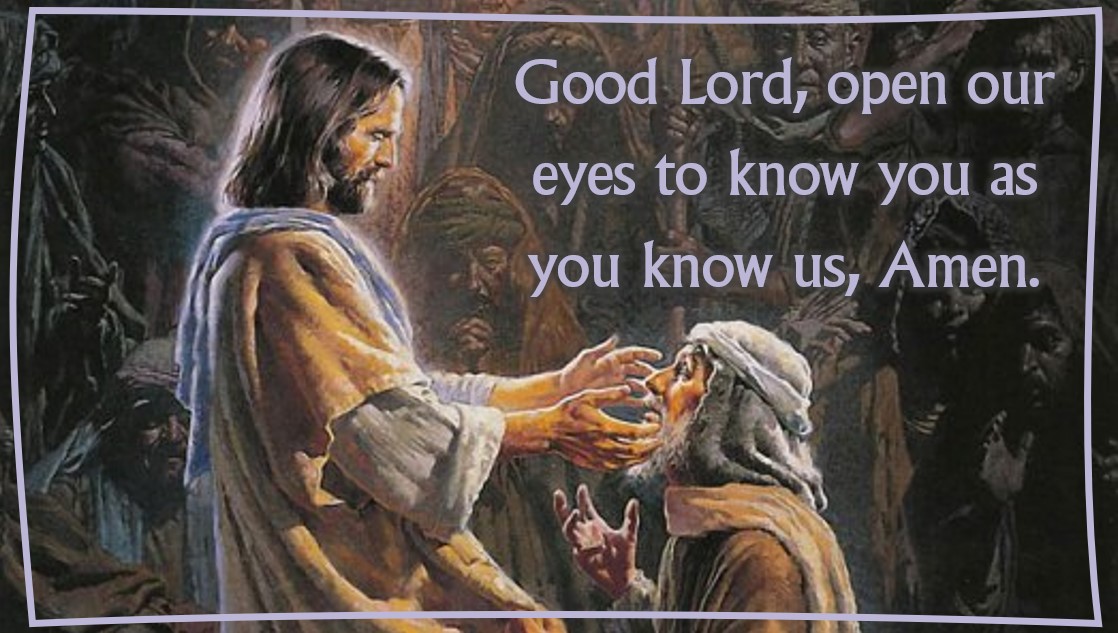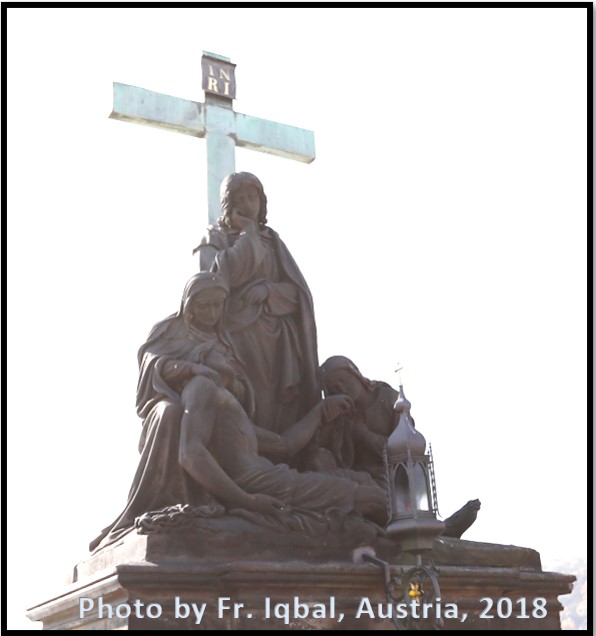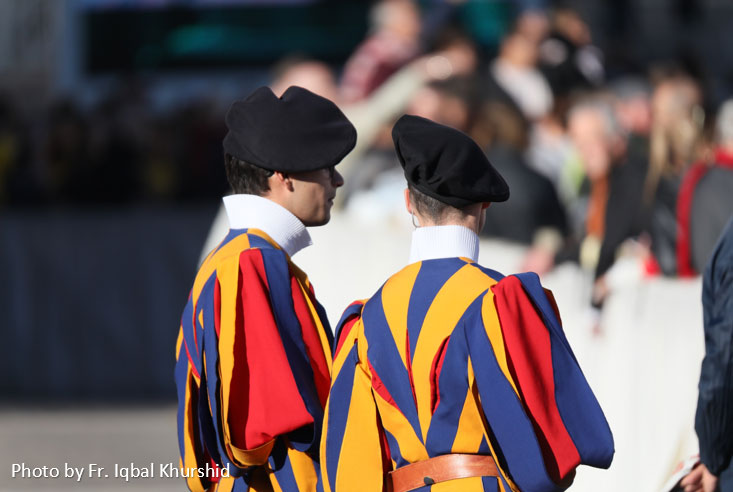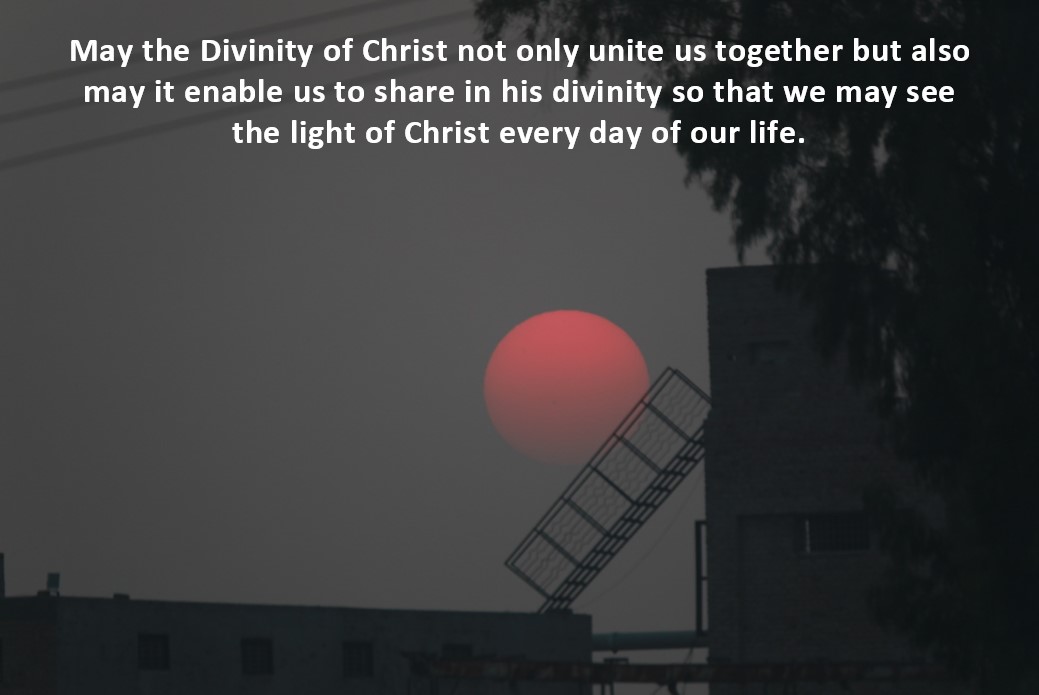
4th Sunday of Lent Year A ~ March 19, 2023
HE KNOWS US
As we continue our Lenten journey, once again we are reminding to look deep inside of ourselves to examine our relationship with the Lord. Do we know him as he knows us? He is our Good Shepherd and there is nothing we shall want. He leads us to green pastures and leads us with his rod and staff through the green pastures and will anoint us with the purest oil. Let us reflect on this story before I continue.
Once a woman lost her husband when her son was only four. Since she was young and found it hard to raise her son alone, decided to marry another. One day when she came back from her work and saw her son sitting on the ground with a very sad face. She came closer to him and asked, “what happened son?” “Do fathers tell lies?” asked the son in return. “Absolutely not” answered the mother. “Then my first father was a liar, and my other father is truthful” said the son with anger. “How can you say he was a liar?” asked the mother. “When I used to play, and he would call me to eat, but I continued to play. He would ignore what I was doing and give me food. But when I do the same thing with my other father, and he says that he won’t give me food and hasn’t for the last three days I am starving”.
Isn’t it an amazing story to relate with this Sunday’s Readings. God knows our ins and outs and he loves us though we are weak and fall short of his grace but he’s slow to anger and bounding in love and mercy. God knows us more than we do, because he created us in his own image and has given his breath for us to breathe. During this month, I have gone to schools for Lenten Liturgies and Penitential services which has led me to reflect on the following as I spoke with students:
- Does God know who am I?
- How can I deepen my relationship with him?
- Do you think God will forgive me if I commit sin or forget to pray?
- Why did Jesus die on the Cross with nails in his hands and feet and a crown of thorns on his head?
- Why did he die on the Cross?
- How can I feel that God is here for me?
There were more questions and answers I got, and I believe they all lead us to understand that God knows us very well. When I say God knows us, it is not something to consider superficial but to understand that He knows and wants to save us (Please read Ezekiel 33:1-12).
Saint Gregory the Great, reflecting on the Prophet Job says “Holy Job is a type of the Church. At one time he speaks for the body, at another for the head. As he speaks of its members, he is suddenly caught up to speak in the name of their head. So, it is here, where he says: I have suffered this without sin on my hands, for my prayer to God was pure. Christ suffered without sin on his hands, for he committed no sin and deceit was not found on his lips. Yet he suffered the pain of the cross for our redemption. His prayer to God was pure, his alone out of all mankind, for in the midst of his suffering he prayed for his persecutors: Father, forgive them, for they do not know what they are doing. Is it possible to offer, or even to imagine, a purer kind of prayer than that which shows mercy to one’s torturers by making intercession for them? It was thanks to this kind of prayer that the frenzied persecutors who shed the blood of our Redeemer drank it afterward in faith and proclaimed him to be the Son of God. The text goes on fittingly to speak of Christ’s blood: Earth, do not cover over my blood, do not let my cry find a hiding place in you. When man sinned, God had said: Earth you are, and to earth you will return. Earth does not cover over the blood of our Redeemer, for every sinner, as he drinks the blood that is the price of his redemption, offers praise and thanksgiving, and to the best of his power makes that blood known to all around him. Earth has not hidden away his blood, for holy Church has preached in every corner of the world the mystery of its redemption”.
He continues to reflect to help us to understand that God knows us “Notice what follows: Do not let my cry find a hiding place in you. The blood that is drunk, the blood of redemption, is itself the cry of our Redeemer. Paul speaks of the sprinkled blood that calls out more eloquently than Abel’s. Of Abel’s blood Scripture had written: The voice of your brother’s blood cries out to me from the earth. The blood of Jesus calls out more eloquently than Abel’s, for the blood of Abel asked for the death of Cain, the fratricide, while the blood of the Lord has asked for, and obtained, life for his persecutors. If the sacrament of the Lord’s passion is to work its effect in us, we must imitate what we receive and proclaim to mankind what we revere. The cry of the Lord finds a hiding place in us if our lips fail to speak of this, though our hearts believe in it. So that his cry may not lie concealed in us it remains for us all, each in his own measure, to make known to those around us the mystery of our new life in Christ”.
Someone rightly wrote that that there 12 things in Bible says God knows us:
- My hair — Matthew 10:29-30
- My beginning — Jeremiah 1:5, Psalm 139:13-18
- My relationship with Him — Nahum 1:7, Romans 8:16-17, John 10:28
- My name — Exodus 33:12, 17
- My heart — Jeremiah 17:9-10, 1 John 3:20, 1 Kings 8:39, Psalm 66:18, Matthew 5:8
- My thoughts — Psalm 139:2b, Job 42:2, 2 Corinthians 10:5
- My worries — Matthew 6:25-34, 1 Peter 5:7
- My actions — Ecclesiastes 12:14, 2 Corinthians 5:9-10
- My words — Psalm 139:4, Matthew 12:36
- My way — Job 23:10, Psalm 23:4, Proverbs 16:9, Psalm 139:3
- My weakness — Psalm 103:14, 2 Corinthians 12:9-10
- My days— Psalm 90:12, James 4:14, Hebrews 9:27, Psalm 31:15a
In today’s First Reading is a beautiful passage of learning to understand that God knows as he did with David “He is the one after my own heart”. We all know that God chose King David to rule over the House of Israel and shepherd them. He became such a faithful servant of the Lord that he promised him that his kingdom and the promised was fulfilled in the Saviour “God will give him the throne of his ancestor King David and there will be no end to his Kingdom” as we read in the Gospel of St. Luke. We can learn that God does not look at what man looks at. Eliab was the oldest, and Samuel was immediately impressed by his physical appearance. Perhaps he was bigger, taller, and stronger than the rest. Either way, Samuel was impressed by him and thought, “Surely the Lord’s anointed stands here before the Lord.” He certainly looked the part! God does not look at what man looks at. God says, “For my thoughts are not your thoughts, neither are your ways my ways. As the heavens are higher than the earth, so are my ways higher than your ways and my thoughts than your thoughts” (Isaiah 55:8-9). When Jesus taught the Sermon on the Mount he began with the Beatitudes: “Blessed are the poor in spirit, for theirs is the kingdom of heaven. Blessed are those who mourn, for they will be comforted. Blessed are the meek, for they will inherit the earth.” We read the Beatitudes, and it seems like Jesus is turning all our attitudes upside down. We don’t naturally think that way. But that’s because God does not think the way we think, and God does not look at what we look at.
During the season of Lent, we are invited to build our relationship with the Lord and walk with him to deepen our relationship with the Lord. However sometimes we fail to see that he knows us and he has called us to be his children. St. Augustine as a teenager was good and did everything to get worldly pleasures but the day he came to know God and give his life to him, he became “Father of the Church” and had such a deep understanding of God that we can’t live without praising him. His “Confession” basically reveals his inner story of life that was known by God. Whenever he pens his reflection, we could see the depth of his faith and relationship with the Lord; “The Lord tells us: I am the light of the world; he who follows me will not walk in darkness but will have the light of life. In these few words he gives a command and makes a promise. Let us do what he commands so that we may not blush to covet what he promises and to hear him say on the day of judgment: “I laid down certain conditions for obtaining my promises. Have you fulfilled them?” If you say: “What did you command, Lord our God?” he will tell you: “I commanded you to follow me. You asked for advice on how to enter into life. What is life, if not the life about which it is written: With you is the fountain of life?” Let us do now what he commands. Let us follow in the footsteps of the Lord. Let us throw off the chains that prevent us from following him. Who can throw off these shackles without the aid of the one addressed in these words: You have broken my chains? Another psalm says of him: The Lord frees those in chains, the Lord raises up the downcast.
Those who have been freed and raised up follow the light. The light they follow speaks to them: I am the light of the world; he who follows me will not walk in darkness. The Lord gives light to the blind. Brethren, that light shines on us now, for we have had our eyes anointed with the eye-salve of faith. His saliva was mixed with earth to anoint the man born blind. We are of Adam’s stock, blind from our birth; we need him to give us light. He mixed saliva with earth, and so it was prophesied: Truth has sprung up from the earth. He himself has said: I am the way, the truth, and the life. We shall be in possession of the truth when we see face to face. This is his promise to us. Who would dare to hope for something that God in his goodness did not choose to promise or bestow? We shall see face to face. The Apostle says: Now I know in part, now obscurely through a mirror, but then face to face. John the apostle says in one of his letters: Dearly beloved, we are now children of God, and it has not yet been revealed what we shall be. We know that when he is revealed we shall be like him, for we shall see him as he is. This is a great promise.
If you love me, follow me. “I do love you,” you protest, “but how do I follow you?” If the Lord your God said to you: “I am the truth and the life,” in your desire for truth, in your love for life, you would certainly ask him to show you the way to reach them. You would say to yourself: “Truth is a great reality; life is a great reality; if only it were possible for my soul to find them!”.
He is our Good Shepherd who leads us to green pastures and there is no fear of the valley of death because his staff and rod leads us. (Please read Ezekiel 34 & John 10). “I am the Good Shepherd who lays his life for his sheep because he knows them, and they know him” as St. John says. I just like to share few quotes of saints to understand that God knows us and how our relationship with him should be:
“Jesus Christ, Lord of all things! You see my heart; you know my desires. Possess all that I am—you alone. I am your sheep; make me worthy to overcome the devil.”- St. Agatha
“It is better to be a child of God than king of the whole world.”– St. Aloysius Gonzaga
“He who trusts in himself is lost. He who trusts in God can do all things.”
“What does it cost us to say, ‘My God help me! Have mercy on me!’ Is there anything easier than this? And this little will suffice to save us if we be diligent in doing it.”– St. Alphonsus Liguori
“It is with the smallest brushes that the artist paints the most exquisitely beautiful pictures.”– St. André Bessette
“No one will have any other desire in heaven than what God wills; and the desire of one will be the desire of all; and the desire of all and of each one will also be the desire of God.”-St. Anselm
“If you are what you should be, you will set the whole world on fire!” – St. Catherine of Siena
“As soon as I believed there was a God, I understood I could do nothing else but live for him, my religious vocation dates from the same moment as my faith: God is so great. There is such a difference between God and everything that is not.” – Blessed Charles de Foucauld
I would like to give you recap of the Gospel Readings for the last three Sundays to understand how important our Lenten journey is. First Sunday we reflected on the Temptations of Jesus in the desert to help us that God will never put us to any test or temptation which is beyond our power. On the Second Sunday of Lent we reflected on the Transfiguration of the Lord to work on our conversion of heart and just be like St. Peter who says, “Lord it good to be here….”. And then the Gospel of Last Sunday invited us to be thirsty for Jesus the living water and become messenger of his message to others, as Samaritan woman did. The Gospel did remind us that he is thirsty for us and keeps asking us “give a drink” and what is our response, we need to think and reflect upon that. However today’s Gospel brings us to a very interesting situation about a blind person whose sight was restored by the Lord but the attitude of the people is a complete rejection of the Lord.
Holy Father Pope Francis has a beautiful reflection on the Gospel and he says “Today’s Gospel sets before us the story of the man born blind, to whom Jesus gives sight. The lengthy account opens with a blind man who begins to see, and it closes, and this is curious with the alleged seers who remain blind in soul. The miracle is narrated by John in just two verses, because the Evangelist does not want to draw attention to the miracle itself, but rather to what follows, to the discussions it arouses, also to the gossip. So many times, a good work, a work of charity arouses gossip and discussion, because there are some who do not want to see the truth. The Evangelist John wants to draw attention to something that also occurs in our own day when a good work is performed. The blind man who is healed is first interrogated by the astonished crowd, they saw the miracle and they interrogated him, then by the doctors of the law who also interrogated his parents. In the end the blind man who was healed attains to faith, and this is the greatest grace that Jesus grants him: not only to see, but also to know Him, to see in Him “the light of the world”.
While the blind man gradually draws near to the light, the doctors of the law on the contrary sink deeper and deeper into their inner blindness. Locked in their presumption, they believe that they already have the light, therefore, they do not open themselves to the truth of Jesus. They do everything to deny the evidence. They cast doubt on the identity of the man who was healed, they then deny God’s action in the healing, taking as an excuse that God does not work on the Sabbath; they even doubt that the man was born blind. Their closure to the light becomes aggressive and leads to the expulsion from the temple of the man who was healed.
The blind man’s journey on the contrary is a journey in stages that begins with the knowledge of Jesus’ name. He does not know anything else about him; in fact, he says: “The man called Jesus made clay and anointed my eyes”. Following the pressing questions of the lawyers, he first considers him a prophet and then a man who is close to God. Once he has been banished from the temple, expelled from society, Jesus finds him again and “opens his eyes” for the second time, by revealing his own identity to him: “I am the Messiah”, he tells him. At this point the man who had been blind exclaims: “Lord, I believe!”, and he prostrates himself before Jesus.
Our lives are sometimes similar to that of the blind man who opened himself to the light, who opened himself to God, who opened himself to his grace. Sometimes unfortunately they are similar to that of the doctors of the law: from the height of our pride, we judge others, and even the Lord! Today, we are invited to open ourselves to the light of Christ in order to bear fruit in our lives.
With this blind man we see two elements: first as a human, we have little knowledge of others and God, and we are quick to judge. Second, God sees what is hidden from our human eyes and he heals us from infirmities and iniquities so that we can recognize him.
I suggest that today, you take the Gospel of John and read this passage. It will do you good, because you will see the road from blindness to light and the other evil road that leads to deeper blindness. Let us ask ourselves about the state of our own heart? Do I have an open heart or a closed heart? Is it opened or closed to God? Open or closed to your neighbour? If God knows us, do we know him?
Let me conclude my reflection with the following story to help us to deepen our relationship with God who knows otherwise….
Once evil spirits complained to God, “why are they treated so badly and live in ruins whereas good spirits dwell in such a magnificent palace and enjoy their lives? God explained to them “I made everyone equal, but you have become evil spirits by your own actions and choice”. But even after God’s persuasion, evil spirits kept complaining about discrimination. So God thought for sometime and called all the good and evil spirits together and said, “I have made a decision on request of evil spirits, from today onward all the palaces and ruins that you had been given to stay in will be destroyed. Now both of you are given freedom to build your own separate cities.
Then a soul said, “But for this, where do we get bricks from?”
“When a person on earth tells a truth or lie, a brick will be prepared here in return for it. All the bricks will be same in strength. Now, it is for you to decide whether you will take bricks made out of truth or lies” replied God.
Evil spirits thought, more people tell lies on earth, if they took bricks made by lies then a huge city could be built. So, they told God that they would be using bricks made of lies, and on the other hand good got bricks made by truth.
Construction of both cities began simultaneously; within a few weeks city of evil spirits began to take huge form as they constantly started getting bricks made of lies and they were able to build a magnificent city. However, construction of good spirits was very slow. They were only able to build a very small part of the city.
But after few days as the evil spirits were enjoying their stay in their new homes, suddenly a strange incident happened, bricks began to disappear and then their city turned into ruins. Troubled evil spirits immediately ran to God and asked, “Why have these bricks suddenly started disappearing from our homes, our city has become ruin again?”
God smiled and said, “Bricks started disappearing! Well, it seems that the lies of those who lied were caught and that’s why it happened. People have come to know me as I know them”.
Other Sermons In This Series

20th Sunday in Ordinary Time Year C ~ August 14, 2022
August 12, 2022

Be On Guard | November 28, 2021
November 28, 2021

3rd Sunday in Ordinary Time Year A ~ January 22, 2023
January 20, 2023

